- Home
- Peter Ackroyd
Wilkie Collins Page 18
Wilkie Collins Read online
Page 18
At the preliminary readings the theatrical producers had predicted another triumph for the author, and he appeared at the first night with a large camellia in his buttonhole. He may perhaps have already been rehearsing his speech at the curtain calls. It did not quite go to plan. When the “bird doctor” appeared on stage, scattering birdseed in all directions, the audience began to howl. Sir Arthur Wing Pinero, then a young English actor and dramatist, recalled the occasion. “Everything went wrong. The audience, amused by some awkwardly phrased expressions, tittered; then, as the play advanced, broke into unrestrained laughter; and finally, enraged by an indignant protest from one of the actors, hooted the thing unmercifully.” The protest had come from George Anson who at the interval had advanced in front of the footlights and denounced the audience as “a lot of damned cads” who had insulted a “great master.” There were shouts of “Bosh!,” “Nonsense!” and “Get on with the play!” One of the actresses, Alice Lingard, had already broken down in tears.
Rank and Riches, now known as Rant and Rubbish, had failed. The dramatic critic of The Times said that “the want of dramatic purpose in the play—as a result of which the characters seemed to flounder aimlessly about—combined with action bordering at times upon burlesque, and a prevalence of unlucky lines, was more than the public could be expected to endure.”
Collins withdrew the play after a week’s run. He declared that the audience had not understood the drama; they had not sympathised with the characters, either, who introduced a perfectly new element onto the English stage. He was, naturally enough, aggrieved. He and his actors had been “brutally treated”; even the women had been personally insulted. The “jeering and hooting” during the second act were succeeded by “yells of laughter” in the third. He added only that strangers offered him their sympathy and indignation. Yet he was not entirely cast down. He was ready to give it a “new trial” elsewhere.
He was further reassured by the success, a few months later, of The New Magdalen at the Novelty Theatre in Great Queen Street. He did not attend the first night on this occasion; whether he was absent as a result of neuralgia, as he said, or of nerves, is unknown. After the failure at the Adelphi, however, he never wrote another play for the London theatre.
Yet he was still sustained by the success of Heart and Science, and almost immediately set to work upon another serialisation. He wanted to beat the American pirates, and so promised Harper & Brothers that he would present them with a complete manuscript three months before the end of its serialisation in England. There would then be no possibility of the pirates anticipating them. This of course meant unflagging composition, against the advice of Frank Beard, and the last ten chapters of the novel were written without any intermission except for meals and rest. “It is all so real and true to me,” he told one correspondent, “I believe the characters are living people.” The effort of course left him prostrate and exhausted. He felt like “a washed-out rag.” He was taking calomel and colchicum and laudanum. He was also plagued by the further complication of angina that provoked the most painful sensations in his chest or what was known as “breast pang.” These were only relieved by the inhalation of amyl nitrite which left him dizzy but without pain. Still he continued writing.
I Say No was another mystery of an inexplicable death. A young orphaned girl goes in search of the truth about her father’s demise. She discovers that everyone from whom she seeks answers is, in fact, concealing an important element in the fatal story. Was her father murdered, his throat cut with a razor? The resolution is to be found in a bloodstained pocketbook which contains the words “I say no.” So begins a compelling and almost irresistible narrative in the manner of Collins. It is a novel of pure suspense in which people come together, accidentally or coincidentally; they are linked by a deadly secret which only they can unravel. No one could plot this more finely than Collins himself.
And then his dog died. Tommy had been a constant companion for many years, and Collins was more desolate at this loss than at any time since the death of his brother; he said that he had suffered terribly during his pet’s last illness. He had written in The Fallen Leaves that “there are periods in a man’s life when he finds the society that walks on four feet a welcome relief from the society that walks on two.” At night Tommy would come up to him, look at him, wag his tail, and groan; this was his signal that it was time to go to bed. Now he could walk nowhere and do nothing without missing the little Scottish terrier.
His spirits were lifted a little in the course of a curious correspondence with an eleven-year-old girl. He had met Nannie Wynne and her mother through the agency of Frank Beard, who was also their doctor. Collins was always immensely fond of children and their idiosyncrasies; some of the most charming moments of his fiction are devoted to them. He had the gift of an imaginative man in taking the conversations and the ideas of children entirely seriously.
The correspondence seems to have begun in the summer of 1885 and concluded in the spring of 1888. Collins’s letters are couched in a teasing and affectionate style; he became her husband, and she was addressed as Mrs. Wilkie Collins or “Dear and admirable Mrs. Collins.” “This morning I had some red hot scratches again, and had to sniff at my ‘Amyl’ (N.B. This is not the Christian name of another wife. It is only a glass capsule).” It was all perfectly innocent and demonstrates how quickly Collins could slip into a delightful fantasy life. It was perhaps the only way in which he could contemplate marriage.
CHAPTER NINETEEN
That’s Me
By the autumn of 1885 he was writing a drama and a novel simultaneously; they were essentially the same work but the laws of copyright meant that Collins had to make sure that the play was acted first in order to secure his rights. He believed that the story was essentially dramatic in spirit, and that to allow the “pirates” to steal it for the stage was to remove much of its impact. He started work in Ramsgate, but was driven out by the noise of brass bands and costermongers selling fish; so he returned to the “old work shop” of Gloucester Place. He really now seemed dedicated to his work, to the exclusion of almost everything else.
The Evil Genius began its newspaper syndication in December 1885, and Tillotson of the “Fiction Bureau” paid him more for it than any previous book. There was no sense of a decline, at least in material fortunes. It has as its focus an unhappy household of man and wife with a young daughter. When an attractive governess enters the plot, the usual complications ensue. Governess leaves household but is called back when daughter pines for her; wife runs off with daughter and, after obtaining a Scottish divorce, goes into hiding. More complications and misunderstandings bring misery until husband and wife decide to remarry.
As always Collins concocts a complete nervous stew of people constantly afraid and constantly on the watch, relapsing into neuralgic fever, stealing each other’s letters, running away from one another, terrified of nervous collapse or nervous paralysis; the two dominant passions are those of greed and of fear. This is also the atmosphere of the long story that Collins wrote after the completion of The Evil Genius. “The Guilty River” was composed at high speed accompanied by all the signs of nervous anxiety and prostration. It is not clear what compulsion seized him at such times. It may have been in part the need for money as reassurance. It may have been the fear of idleness leading to a breakdown; a man who has been busily engaged in work for most of his life may look with horror upon the vacancy of free time. But it may also have been the compulsion of the storyteller. He said that “The Guilty River” was knocking on his head and whispering, “Why don’t you let me out?”
He was working on the story twelve hours a day, and finished it within a month. It is the story of a deaf lodger, known as “The Cur,” who falls in love with his landlord’s daughter and who tries to murder by poison a rival to her affections.
“Men of your age,” he resumed, “seldom look below the surface. Learn that valuable habit, sir—and begin by looking below the surface of Me�
�Discover for yourself,” he said, “what devils my deafness has set loose in me; and let no eyes but yours see that horrid sight. You will find me here tomorrow, and you will decide by that time whether you make an enemy of me or not.”
The stress of work of course ruined Collins’s already fragile health once more. He told Nina Lehmann that, like the post-horses of a previous age, he had galloped along without feeling the strain. But “do you remember how the forelegs of those post-horses quivered, and how their heads dropped, when they came to the journey’s end? That’s me, Padrona—that’s me.” Or, as he put it to another correspondent, he was “dead beat”; he felt weary, and old, and depressed. His brains were so addled after the effort that he did not know which end of him was uppermost.
In the course of this hard year, he was rarely “at home” to casual visitors. The London fog was choking him. “Did you wish you had never been born this morning?” he asked Watt. “I did.” He could not sleep at night. He warned Edward Pigott about draughts in railway carriages. He was dying for the sight and the smell of the sea but, when he eventually reached Ramsgate in the summer of 1886, he was greeted by two thunderstorms and air almost too hot to breathe. When he was threatened once more with gout in the eye, he broke out in what he called “a blue funk.” He was soon to suffer from a feverish cold in the London winter. The night air affected his chest. Nevertheless he still managed to get out. He took Caroline and Carrie to his box to see Lily Langtry in The Lady of Lyons, and was hoping to get to the Haymarket in the following week to see Jim the Penman. Theatre was like a drug to him. It took him out of the world.
The heat of the following summer induced in him a peculiar kind of nervous apprehension. He started when even a door was unexpectedly opened. He told a friend that, on the last occasion he had dined out, he had been “sick with fright” every time the cab turned a corner. Beard had advised him to leave London, but he regarded with horror the prospect of any railway journey; the noise associated with it appalled him. The only remedy for him was a quiet night walk in a peaceful neighbourhood. When the air turned raw with winter, he became a prisoner at home.
He used to quote Samuel Johnson to the effect that “what must be done will be done.” In that mood, therefore, he began work on what would be his last completed novel. The Legacy of Cain was serialised by Tillotson in various provincial newspapers but even as he was trying to keep up with the weekly episodes he was obliged to move house. His lease at Gloucester Place had run out and, in the face of exorbitant demands from his landlord, he looked for alternative accommodation in the neighbourhood.
He, or perhaps Caroline Graves, found the upper part of a house at 82 Wimpole Street and for the last time he endured the agonies of moving. He quoted the comments of his household. “If you please, sir, I don’t think the looking glass will fit in above the book-case in this house.” “If the sideboard is put in the front drawing-room, we don’t know where the cabinets are to go.” “Here is the man, sir, with the patterns of wall-paper.” “I beg your pardon, sir, did I understand that you wanted a lamp in the water-closet?” After two months the carpet had still not been laid in the dining room. And all the time he was only just keeping up with the flow of what the newspapers called “copy.” The house did have its benefits, however. It was in a much quieter area than Gloucester Place; there was no mews at the back, only the storehouses of the traders of Wigmore Street.
He was not sure, when composing The Legacy of Cain, whether he was writing “over the heads” of the contemporary public but it is not at all clear what he meant by that. It is essentially a drama of heredity and fate, including the key Collins elements of poison and attempted murder, madness and mistaken identity. Two young girls have been brought up together as sisters, although in fact one of them is an adopted orphan. The orphan is the daughter of a murderess who was executed for the savage murder of her husband; her “sister” is the perfectly brought-up scion of a pious household. Which of them will turn to the bad? That is the legacy in question. There were many theories in the period on the nature of heredity, but Collins was essentially bored by theories. In this novel, as in the past, his most important concern is with the simple telling of the story.
Hall Caine was a visitor at Wimpole Street. He described Collins as quiet and a little nervous. “He sat while he talked with his head half down, and his eyes usually on the table; but he looked into one’s face from time to time, and his gaze was steady and encouraging.” His diffidence may have been a result of the exhaustion to which he was a prey.
When he attended a banquet held by the Society of Authors in the summer of this year, 1888, however, he was anxious to know who were the new celebrities in the world of literature. It is not known to whom he was introduced, but his opinion of the “up and coming” writers was not necessarily high. He remarked that, according to the newspapers, seven or eight “great geniuses” were to be celebrated every week. On a literary feud currently being conducted in the public prints, he commented only that “these wretched creatures are completely saturated with self-conceit.” One of his characters in The Evil Genius remarks of “new writers” that they provide “no story to excite our poor nerves; no improper characters to cheat us of our sympathies; no dramatic situations to frighten us; exquisite management of details (as the reviews say) and a masterly anatomy of human motives which—I know what I mean, my dear, but I can’t explain it.”
Of all the younger writers he seems most to have admired Rider Haggard, whose King Solomon’s Mines and She amply followed his example of forcefully telling a story. He never mentions Henry James or Thomas Hardy, but he did say that he enjoyed the first half of Robert Louis Stevenson’s Kidnapped. He had what might be called old-fashioned tastes.
—
At the beginning of 1889, having left a dinner party, he hired a four-horse cab. Just as it was coming out into Knightsbridge it collided with another vehicle; his cab tipped over, and bits of glass covered him. He went flying out of the upper door and fortunately landed on the pavement without a bruise. He had also been uninjured by the glass, but he was shaken. It was not a good omen for the year. He was soon suffering from neuralgic attacks that could only be soothed by tablespoonfuls of laudanum.
He was still, however, eager to begin another novel. He said his invention was “boiling” with new characters and new stories. Blind Love was in part concerned with a great insurance fraud recently uncovered in Germany; a man takes out a life insurance policy but then ensures that a dying man, closely resembling him, takes his place in a hospital. The poor man’s death was then hastened by poison. Collins combined this plot with the story of the obsessive love of a good-hearted woman for a rogue. It has all the ingredients of his later fiction.
By 21 June he marked on the manuscript that “the story, so far, has been written for press to the end of Part 18.” Nine days later he suffered a stroke; his left side was paralysed and it was feared that his brain had also been affected. Frank Beard arrived and determined to stay the night. He was conscious at intervals, but had some “suffocation” about the heart. Carrie Graves wrote to Watt that “he is light-headed at times, and does not know how ill he is.” He was also “hyper-excited” with anxiety about the progress of the novel. He did not know, but may have guessed, that he would not work on it again. A month later Carrie Graves reported him to be gaining in strength, but she mentioned that the “paralysis” was still affecting his brain. She wrote to the novelist Mary Elizabeth Braddon that “it is a terrible shock—to see such a wonderful genius struck down in an instant.” He was more composed than before, however, and was talking a great deal about the past; she told the novelist that “it makes your heart ache to see and hear him.”
On 4 August he suffered a relapse, and was unable to eat or drink for twenty-six hours. But then he rallied once more, and Caroline was able to take breakfast with him. He seemed much revived, and Carrie took her children to Brighton; two paid nurses were still in the house. At the end of the month he d
ictated a letter by means of his oldest daughter, Marian, to Watt in which he reported that the doctor was content with his progress. It was Watt who relieved his anxieties over the unfinished Blind Love by persuading another novelist, Walter Besant, to complete it for him. It was not as difficult a task as it might seem since Collins, according to his familiar practice, had sketched out every twist and turn of the plot in great detail; he had also composed some of the dialogue. “I was much struck,” Besant wrote, “with the writer’s perception of the vast importance of dialogue in making the reader seize the scene.” The serialisation had begun in the Illustrated London News on 6 July and continued uninterrupted until the end.
By the beginning of September Collins’s hand was steady enough to write a letter to Frederick Lehmann in which he announced that the doctor was “hopeful” and that he himself looked forward to “healthier days.” He was too weak to see all of the visitors who came to Wimpole Street but he did manage to converse with George Redford, who used to play the cello at George Eliot’s musical evenings. Redford later recalled that “he said as he grasped my hand with all his old warmth, ‘you see I’m alright—feel my arm.’ ” He and Redford then smoked a cigar together. Redford added that “I had hard work to hide my eyes.” An attack of bronchitis then intervened, two weeks later, and he was huddled up by the fire wrapped in blankets. On 21 September he scribbled a note in pencil to Frank Beard. “I am dying old friend. W.C.” Then, on a separate piece of paper, he jotted down another message. “They are driving me mad by forbidding the Hy…Come for God’s sake. I am too wretched to write.” Hy…might be the beginning of hypodermic. Beard came at once but now his patient was beyond the help of any earthly agency. He sank slowly and without pain. In her diary for Monday, 23 September, Caroline Graves wrote that “Wilkie died at 10 a.m.”

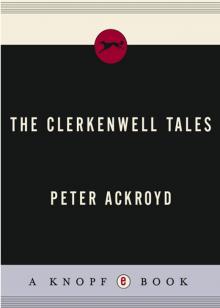 The Clerkenwell Tales
The Clerkenwell Tales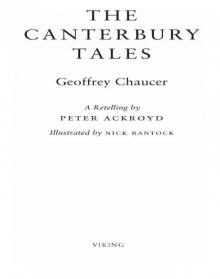 The Canterbury Tales
The Canterbury Tales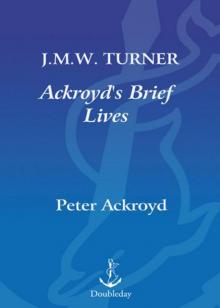 J. M. W. Turner
J. M. W. Turner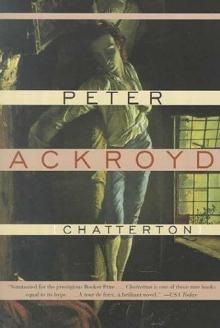 Chatterton
Chatterton The Canterbury Tales – A Retelling
The Canterbury Tales – A Retelling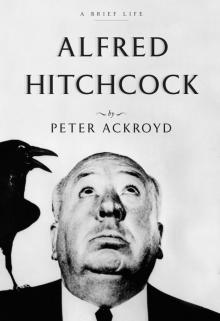 Alfred Hitchcock
Alfred Hitchcock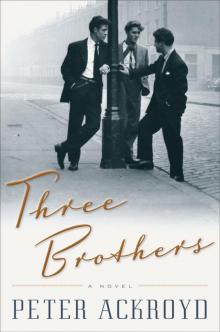 Three Brothers
Three Brothers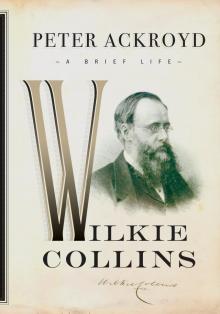 Wilkie Collins
Wilkie Collins Venice
Venice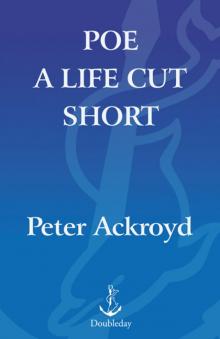 Poe
Poe The Lambs of London
The Lambs of London London
London Queer City
Queer City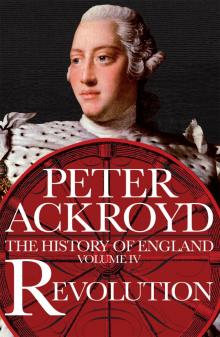 Revolution, a History of England, Volume 4
Revolution, a History of England, Volume 4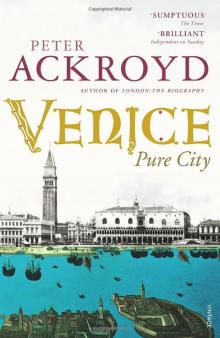 Venice: Pure City
Venice: Pure City Foundation
Foundation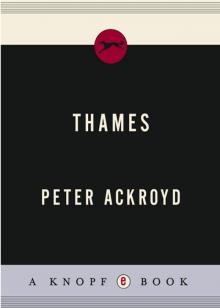 Thames
Thames The Plato Papers
The Plato Papers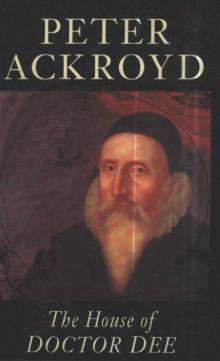 The house of Doctor Dee
The house of Doctor Dee Rebellion: The History of England from James I to the Glorious Revolution
Rebellion: The History of England from James I to the Glorious Revolution Albion: The Origins of the English Imagination
Albion: The Origins of the English Imagination The Fall of Troy
The Fall of Troy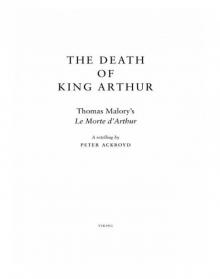 The Death of King Arthur
The Death of King Arthur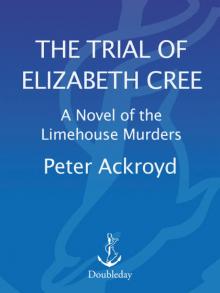 The Trial of Elizabeth Cree
The Trial of Elizabeth Cree London: The Biography
London: The Biography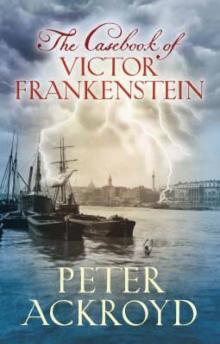 The Casebook of Victor Frankenstein
The Casebook of Victor Frankenstein Hawksmoor
Hawksmoor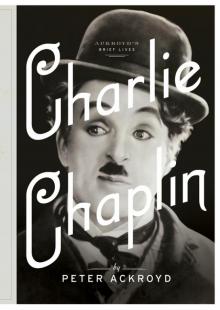 Charlie Chaplin
Charlie Chaplin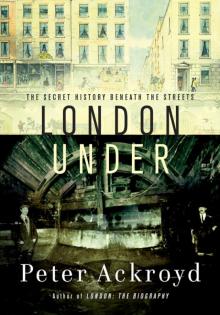 London Under
London Under